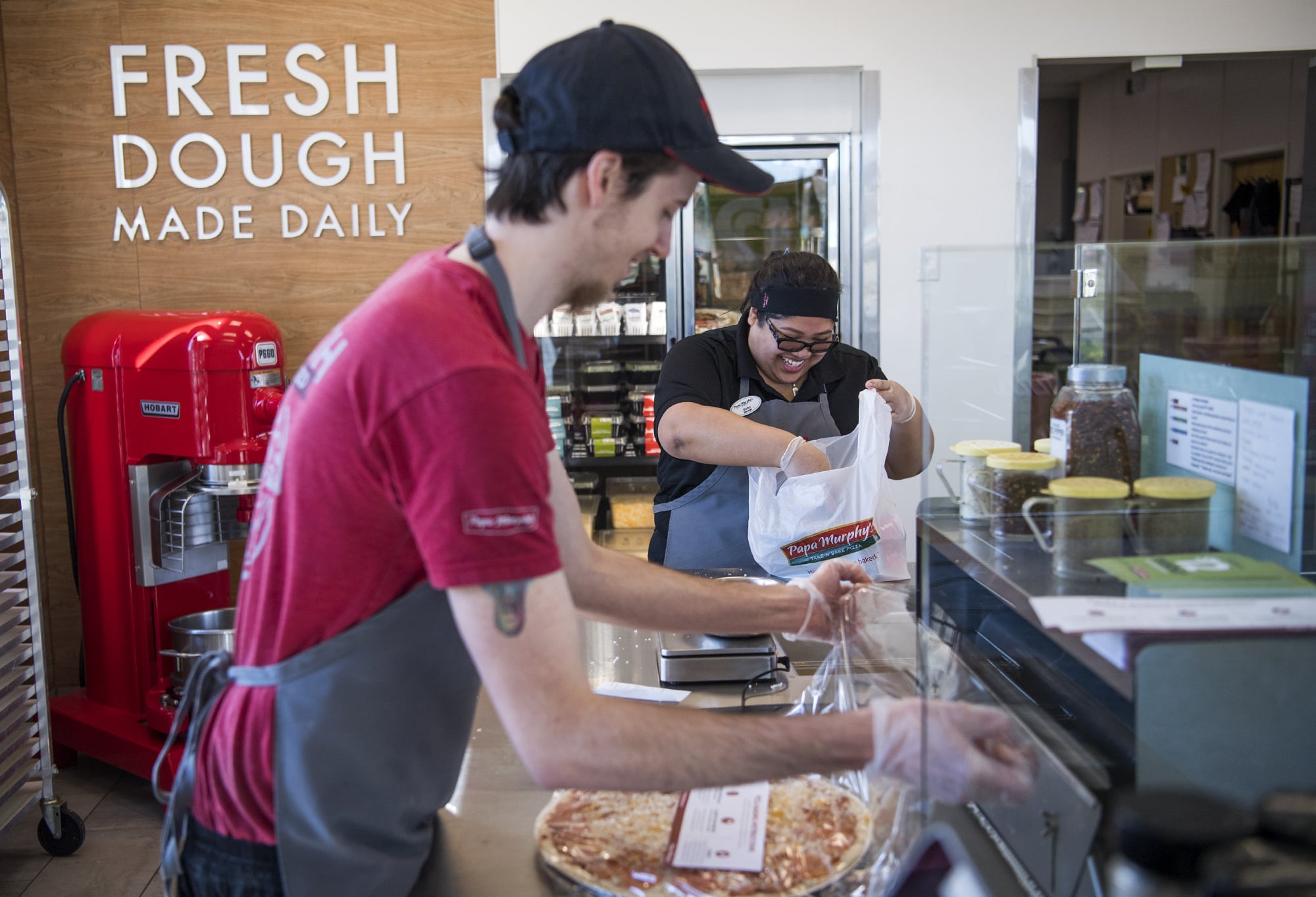Restaurant industry franchising company MTY Food Group Inc. of Canada will acquire Papa Murphy’s, the Vancouver-based take-and-bake pizza maker that bills itself as the United States’ fifth-largest pizza chain, the companies announced Thursday morning.
MTY will acquire all shares of Papa Murphy’s stock for cash at $6.45 per share, for a total of approximately $190 million, the companies said. The acquisition would include Papa Murphy’s approximately $77.4 million debt, which MTY will repay using its credit and cash.
Thursday’s news follows Papa Murphy’s announcement, revealed in November, that it was evaluating “strategic alternatives” and conducting “a comprehensive review of its business strategy” with the help of a merger-and-acquisition specialist. One of the options, the company said, was a sale of the company.
Papa Murphy’s will become a wholly owned MTY subsidiary and will continue to be operated as an independent brand under its current management team. MTY said it intends to work with Papa Murphy’s to make capital investments to grow sales.
It wasn’t clear Thursday what will happen to Papa Murphy’s Vancouver headquarters. But the Papa Murphy’s release says MTY looks forward to “maintaining the current support center in Vancouver, WA.”
The headquarters office was reported to employ 183 people as of 2014. Papa Murphy’s executives could not be reached for comment Thursday.
The merger has been unanimously approved by the boards of directors of both companies, but will still need approval from regulators. The companies expect the transaction to close within the next three months.
Papa Murphy’s shares closed at $4.89 on Wednesday, but jumped by more than 30 percent in the opening hours Thursday and remained at that point throughout the day, closing at $6.42.
Papa Murphy’s history
Papa Murphy’s was originally founded in 1981 in Hillsboro, Ore., under the name Papa Aldo’s. The company merged with a similar take-and-bake pizza chain from California called Murphy’s Pizza in 1995, adopting the name Papa Murphy’s and relocating to a new headquarters in Vancouver.
The company went public in 2014, trading on Nasdaq as FRSH, but has been struggling to keep up in an increasingly competitive casual food industry. Its stock price has hovered around $5 per share for the past two years.
The chain’s struggles have been blamed in part on the faster availability of other take-out or delivery food brands that don’t need to be cooked at home. Analysts have also seen signs of trouble in the company’s expansion to markets outside of the Pacific Northwest.
Chris Magana, president of Portland-based IMS Capital and adjunct professor at Washington State University Vancouver, told The Columbian in November that the take-and-bake model is a tougher sell in sunnier parts of the country where residents may not be so keen to crank up their home ovens.
The chain introduced a number of measures aimed at becoming more competitive in the past year, including an online ordering platform and delivery services from some locations. The company has credited those changes for improved sales trends and better-than-expected financial results in recent quarters.
The possibility of a sale of the business was first raised in the fall, when the company announced that it had hired consulting firm North Point Advisors to undertake a review of “strategic alternatives.” No information about the progress of the review was disclosed until today.
“The board of directors and our advisors have thoroughly evaluated all options available to us and are confident that this agreement provides immediate value to our stockholders at a premium over our current share price,” Papa Murphy’s board chair Jean Birch said in the press release. “Merging our unique, differentiated brand with a global leader in franchised restaurant concepts will accelerate on-going efforts to enhance our convenience and relevance and maintain our position as the number one Take ‘n’ Bake pizza chain in the United States.”
The MTY purchase price of $6.45 per share represents a 31.9 percent premium over Papa Murphy’s closing stock price on Wednesday, and a 46.3 percent premium over the closing price on Nov. 7, 2018, just before Papa Murphy’s announced that it was examining a possible sale.
But it falls far short of the high point the company reached in the summer of 2015, when its stock was routinely above $17 per share and peaked at a closing price of $21.47 per share. Papa Murphy’s stock began trending downward in the fall of 2015 and leveled out at around $5 per share in late 2016.
MTY growth
MTY is based in Canada and owns a roster of approximately 75 quick service and casual dining restaurant franchises including Taco Time, Baja Fresh, Cold Stone Creamery, Blimpie subs and the Pinkberry and TCBY frozen yogurt chains.
The company dates its origins to 1979, when Canadian businessman Stanley Ma opened the restaurant Le Paradis du Pacifique in Montreal. He founded several additional restaurants and brands in the following few years, and MTY — originally incorporated as Golden Sky Resources Inc. — became the parent company for Ma’s growing catalog.
The company developed several new franchises through the 1980s and 1990s and began acquiring other brands in 1999. It changed its name to MTY Food Group in 2003, and began trading on the Toronto stock exchange in 2010.
MTY’s largest acquisition to date took place in 2016 when it bought Kahala Brands, the parent company of Cold Stone, Baja Fresh and several other U.S. restaurant franchises. The merger cost roughly $310 million and added approximately 2,800 locations to MTY’s portfolio.
Kahala continues to operate as a subsidiary of MTY, and its Scottsdale, Ariz., headquarters also serves as the offices for MTY’s U.S. operations.
MTY’s franchises now operate in 5,941 locations, most of which are in the United States and Canada — about 500 are located outside of North America. Papa Murphy’s catalog would add another 1,331 franchised locations and 106 corporate-owned restaurants to that total, bringing MTY’s holdings to an estimated 7,378 locations and $4 billion in global sales.
In the press release, MTY CEO Eric Lefebvre lauded Papa Murphy’s 35-year history, loyal customers and the growth potential of the pizza market, and said the merger would bring “tremendous opportunities” for MTY’s expansion in the United States.
“This is an important transaction for MTY as we add a brand with a differentiated position in pizza to our existing U.S. portfolio,” he said in a statement. “We are thrilled about the prospect of welcoming the Papa Murphy’s brand, its franchise partners and employees, to the MTY family.”
Reactions to the merger
Ken Giles, a Woodland-area resident and former co-owner of six Papa Murphy’s franchised locations in Minnesota, said he thought Thursday’s announcement was a good sign for the company and for franchise owners.
In particular, he said he was pleased to see the pizza chain acquired by a restaurant company rather than a private equity firm, which he said he feared would have “raided and burned” the franchise.
“My gut reaction is that this buyer is a good fit,” he said. “It exceeded my expectations.”
Giles speculated that Papa Murphy’s will likely become the biggest brand in MTY’s lineup in terms of number of locations, which he said is a good position for the Vancouver company because it will force MTY to devote substantial attention to reversing the pizza chain’s fortunes.
Giles sold his own restaurants two years ago after 17 years in the business, in part because he wanted to retire, but he said the decision was also prompted by the difficulties he and other franchise owners faced in the past five to 10 years, during which he said the pizza chain has declined from its heyday.
“The pain has been extremely high in the Midwest, and those states outside of the Northwest,” he said.
Giles did voice a note of concern about the amount of money MTY will need to borrow to pay for the acquisition, which he said could put financial stress on the combined business entity.
Magana said the merger made sense for both companies, and described it as a good deal for MTY that would help it break into the U.S. pizza market. The purchase price per share is likely high enough to ensure the merger goes through, he added.
“It’s high enough above where the stock closed (on Wednesday) that they should win over enough of the shareholders to close the deal,” he said.
There are also potential benefits for Papa Murphy’s and its franchisees, he said. The combined entity would be able to find cost savings due to operating as one public company rather than two, and Papa Murphy’s would likely benefit from MTY’s added clout when negotiating with suppliers for prices on raw ingredients.
Analyst Colin Kelly, speaking on behalf of Spokane-based Signia Capital Management, which is Papa Murphy’s third-largest shareholder, said the firm believes Papa Murphy’s has been taking the right steps to position itself for future growth. He said the brand can continue to expand under MTY once same-store sales are stabilized.
“We believe that the average franchise owner is likely to see MTY be even more aggressive on growth initiatives such as online, mobile, and delivery,” Kelly said. “Papa Murphy’s has lagged its competitors in those areas, so those investments should ultimately be beneficial to franchise owners.”




